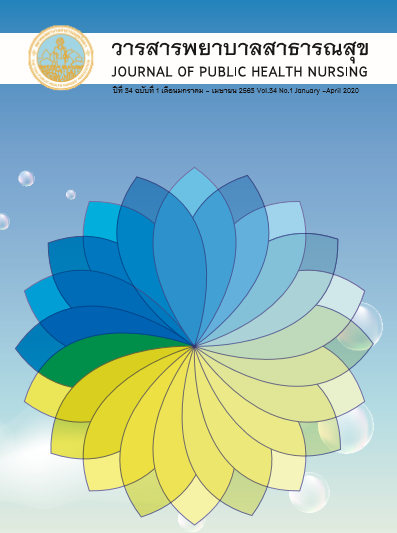Health Promoting Lifestyle on Self care Self regulation and Self efficacy of Nursing Students.
Keywords:
Health promoting lifestyle, Self care, Self regulation, Self efficacyAbstract
Nursing students should be a health promoting lifestyle model included self care, self regulation and self efficacy. The objective of this research was to study health promoting lifestyle on self care, self regulation and self efficacy of them. The sample were 299 nursing students which was selected by purposive random sampling. The research tool was questionnaire of health promoting lifestyle on self care, self regulation and self efficacy which Cronbach’s Alpha Coefficient was 0.79, 0.80 and 0.85 respectively. Data was analyzed by descriptive statistics such as frequency, percentage, mean, standard deviation, and Pearson correlation used to find the relationship. The causal statistics analyzed by using multiple regression analysis.
The results were as following; the most of nursing students were female 93.6% with average age of 23.4 years. The results of health promotion lifestyle found that self care and self regulation were practiced quite a few, while the level of self efficacy were perceived quite a lot. The least level of three health promoting lifestyle consisted of health examination, problem solving with positive thinking, and exercise. The relationship analysis found that age and level of studied were positive correlation among self care, self regulation and self efficacy. The perception on self efficacy was positive correlation both self care and self regulation with statistically significance at the level of 0.01. The analytical of causal statistics indicated that expenses can predict 20% of self care, age and education predict 16% of self regulation, while education and sex can predict 5% of self efficacy. Therefore, knowledge and motivation should be provided for nursing students to have the appropriately health promoting lifestyle of self care, self regulation and self efficacy, which will develop to become more aware of self efficacy.
References
Ekkapakorn W, et al. Health survey report Thai people by the 4th physical examination 2008 - 2. Nonthaburi: The Graphigo Company Systems; 2010. (in Thai)
National Statistical Office. Smoking behavior survey and drinking of the population, B.E. 2014. Bangkok: Tex and Joural; 2015. (in Thai)
SriMorakot P, et al. Development of sustainable health promoting behaviors concerning exercise, nutritional consumption,and stress management trough participation of faculty of nursing,Mahidol university and affililated nursing institutes community Mahidol University And associate institutions. Bangkok: Manat Film; 2008. (in Thai)
Pongphiphat S, Yhattharakron P, Phukaman T. Health behavior of students Chiang Mai University. CMU Journal of Education 2017; 1(1): 34-45. (in Thai)
Intarakamhang A. Health knowledge: measurement and development. (1st ed). Bangkok: Sukhumvit Printing; 2017 (in Thai).
Chow J. Self care for caring practice: Student nurses’ perspectives. International Journal for Human Caring 2008; 12(3): 31-7
Nassar OS, Shaheen AM. Health promoting behaviors of university nursing students in Jordan. Health 2014; 6(1): 2756-63.
Kasipon T, Lekvijitthada P, Jinayon A. Selected factors affecting health promoting behaviors of undergraduate students in Huacheiw ChalermprakietUniversity. Huacheiw Chalermprakiet University Journal 2012; 15(30): 31-46.
Suksathan V. Factors related to health promoting behavior of Suan Sunandha nursing students. The Third National and International conference on Technology and Innovation; 2017. (in Thai)
Thuwanon S, Sathitutsakorn T. Behavioral health of nursing students nursing University Chalermkanchana Sisaket. Academic Chalermkanchana Journal 2017; 4(2): 92-6. (in Thai)
Pender NJ, Murdaugh C, Parsons MA. Health promotion in nursing practice (4th ed.). New Jersey: Upper Saddle River; 2006.
Kumpuengporn K, Saechua S. Healthy lifestyle of students Nakhon Pathom Rajabhat University. Thesis of Master Degree in Public Health Administration, Science Faculty, Nakhon Pathom Rajabhat University. (in Thai)
Musikthong J, Rungamornrat S. Competency in Health Promotion of Nursing Professionals in Central Area of Thailand 2016; 34(1): 88-100. (in Thai)
Chuchuen U, et.al. Effect of potential Development in Health Promotion Leadership on Nursing students’ knowledge, Attitude, and Practice of Health Promotion 2012; 7(3):127-31. (in Thai)
Sirakamol S, et.al. Health Promotion behaviors of Nursing Lecturers. Faculty of Nursing, Chaing Mai University. Research Report. Chaing Mai University. (in Thai)
Lertsakornsiri M, Khampunyo C. Factors Associated with Health Promoting behaviors of Nursing students at Saint Louis College during Practice in the Health care service. Naresuan University Journal: Science and Technology 2017; 25(3): 67-76. (in Thai)
Chaiyasit B. Health Promotion behavior of provincial public health officers Ubol Rachathani. Thesis of Master Degree of Public Health in Health Promotion, Graduate School, Ubol Rachathani Rajabhat University; 2008. (in Thai)
Sirited P, Thammaseeha N. Self-Efficacy theory and self-healthcare behavior of the elderly. Journal of The Royal Thai Army Nurses 2019; 20(2): 58-65. (in Thai)
Bandura A. Social foundations of thought and action: A social cognitive Theory. New Jersey: Prentice-Hall; 1986.
Bandura A. Self-efficacy: The exercise of control. Freeman: New York; 1997.
Setteethama D, Nathapintthu K, Ichida W. Determinant of Health. No appear the place of printing; 2004.
Agunbiade D, Ogunyinka P. Effect of Correlation Level on the Use of Auxiliary Variable in Double Sampling for Regression Estimation, Open Journal of Statistics 2013; 3(5): 312-8. doi: 10.4236/ojs.2013.35037.
Green L, Kreuter M. Health program planning An educational and ecological approach. 4th ed, McGraw Hill: New York; 2005.
Downloads
Published
How to Cite
Issue
Section
License
บทความที่ตีพิมพ์และแผนภูมิรูปภาพถือเป็นลิขสิทธิ์ของวารสารพยาบาลสาธารณสุข (Thai Public Health Nurses Association)







